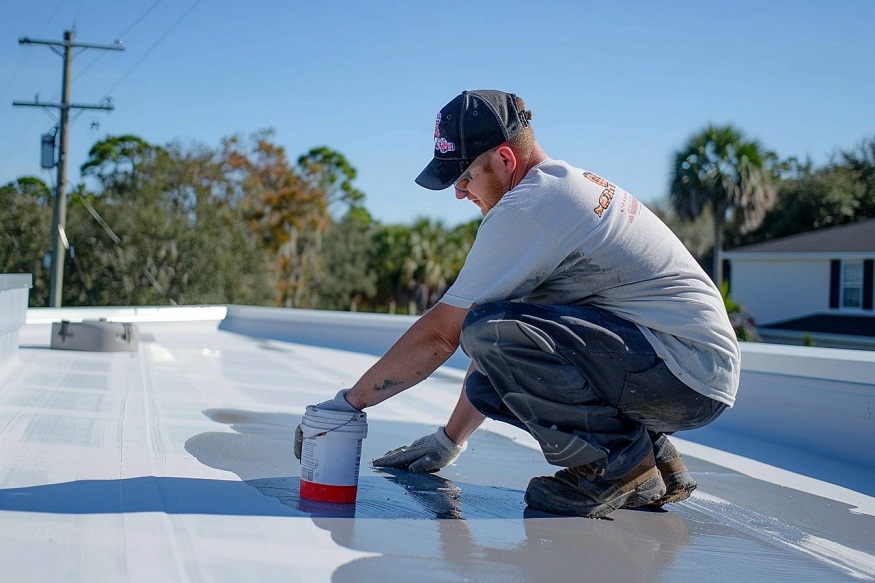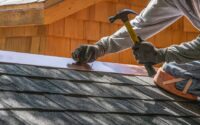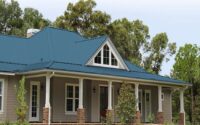Extend Your Roof’s Lifespan: The Best Roof Coating Options for NJ Weather

New Jersey experiences a wide range of weather conditions, from scorching summers to freezing winters, heavy rainfall, and even the occasional hurricane. These extreme weather fluctuations can take a toll on roofs, leading to cracks, leaks, and premature wear and tear. Fortunately, applying a high-quality roof coating can protect your roof, enhance its durability, and extend its lifespan. But with different types of roof coatings available—acrylic, silicone, and polyurethane—how do you determine which is best for NJ’s climate? In this guide, we’ll explore the benefits and best uses for each type of roof coating.
Why Roof Coatings Matter in NJ
Before diving into the specific types of roof coatings, it’s important to understand why roof coatings are essential, especially in a state like New Jersey.
- Weather Protection – Roof coatings act as a protective barrier against harsh UV rays, heavy rain, snow, and fluctuating temperatures.
- Energy Efficiency – Reflective coatings help reduce heat absorption, keeping your building cooler in the summer and reducing energy costs.
- Leak Prevention – Properly applied coatings can prevent water infiltration, reducing the risk of costly water damage and mold growth.
- Extended Roof Lifespan – Coatings add an extra layer of protection that helps delay the need for costly roof replacements.
Now, let’s take a closer look at the best roof coating options for NJ weather.
Acrylic Roof Coatings
Acrylic roof coatings are a popular choice for both commercial and residential buildings in New Jersey. Made from water-based resins, these coatings are known for their affordability, ease of application, and strong UV resistance.
Pros of Acrylic Roof Coatings:
- Highly reflective, reducing cooling costs in hot summers.
- Resistant to UV damage and premature aging.
- Easy to apply and cost-effective.
- Ideal for sloped roofs where water does not pool.
Cons:
- Not as effective for flat roofs due to their lower water resistance.
- Can become brittle in extreme cold temperatures, making them less durable in NJ’s freezing winters.
Best For:
Acrylic coatings NJ work best for sloped roofs on residential homes and commercial buildings where water drainage is efficient.
Silicone Roof Coatings
Silicone coatings are widely recognized for their superior water resistance, making them an excellent choice for NJ’s rainy and snowy climate. They create a seamless, waterproof membrane that withstands ponding water, making them particularly beneficial for flat or low-slope roofs.
Pros of Silicone Roof Coatings:
- Excellent water resistance, making them ideal for NJ’s wet seasons.
- Resistant to UV rays and oxidation, preventing roof degradation.
- Highly flexible, allowing them to expand and contract with temperature changes.
- Long lifespan with minimal maintenance.
Cons:
- Can be more expensive compared to acrylic and polyurethane coatings.
- Dirt and debris tend to stick to the surface, potentially affecting reflectivity over time.
- Slippery when wet, which can be a safety concern for maintenance workers.
Best For:
Silicone coatings NJ are best suited for flat or low-slope roofs in commercial or industrial buildings where water pooling is a concern.
Polyurethane Roof Coatings
Polyurethane coatings offer a strong balance between durability and flexibility. They are particularly known for their high impact resistance, making them a good option for roofs that experience foot traffic or mechanical equipment placement.
Pros of Polyurethane Roof Coatings:
- Superior impact resistance, making them ideal for high-traffic roofs.
- Excellent adhesion to various roofing materials.
- Resistant to UV rays and weathering, ensuring long-term durability.
- Available in both aromatic (lower-cost) and aliphatic (higher-cost but better reflectivity) formulas.
Cons:
- Higher cost compared to acrylic coatings.
- Aromatic polyurethane coatings are not as UV-resistant and may require an additional topcoat.
- Strong odor during application, requiring proper ventilation and safety measures.
Best For:
Polyurethane coatings NJ are ideal for commercial roofs that experience heavy foot traffic, such as warehouses, factories, and rooftop equipment areas.
Choosing the Right Roof Coating for Your NJ Property
When selecting a roof coating, consider the following factors:
- Roof Type & Slope: Flat roofs benefit from silicone coatings, while sloped roofs may perform better with acrylic coatings.
- Weather Resistance Needs: If your building is in an area prone to heavy rainfall or snow accumulation, silicone or polyurethane coatings are better options.
- Budget Constraints: Acrylic coatings are the most budget-friendly but may not last as long as silicone or polyurethane coatings.
- Energy Efficiency Goals: Acrylic and aliphatic polyurethane coatings offer high reflectivity, reducing energy costs.
Final Thoughts
A high-quality roof coating is an investment that can protect your roof from New Jersey’s unpredictable weather, extend its lifespan, and reduce energy expenses. While acrylic coatings are an affordable option for sloped roofs, silicone coatings are the top choice for waterproofing flat roofs, and polyurethane coatings offer the best durability for high-traffic areas. By selecting the right coating for your specific needs, you can enhance your building’s longevity and protect it from the elements for years to come.
If you’re considering a roof coating application in NJ, consult with a roofing professional to determine the best option for your property. A properly applied roof coating can save you money and hassle in the long run while ensuring your roof remains in top condition throughout the seasons.



